Dustborn review
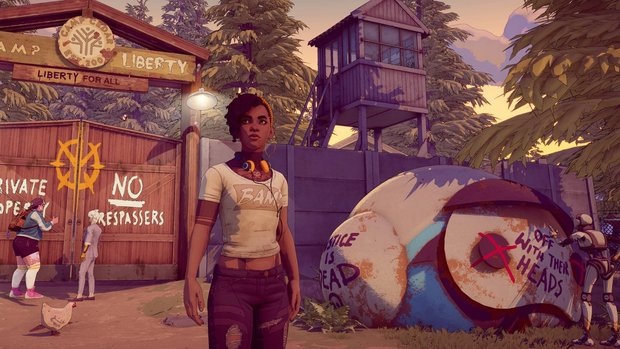
- 2 Comments
Words like “wasted potential” best describe the disappointment of Red Thread’s dystopian road trip action-adventure
As the world’s gaming community grows more diverse, games are increasingly becoming more representative of the folks who play them, and designers are becoming braver at tackling controversial social issues. Red Thread Games exemplifies this with their latest release in Dustborn, a road trip story that explores how the use of language impacts everything in our lives, for better or worse. Regrettably, they failed to create an entertaining adventure around it in this potentially compelling but ultimately overlong and tedious experience.
The story begins in media res, with our heroes Pax, Sai, Noam, and Theo driving down the freeway following a successful albeit apparently terrifying heist to swipe sensitive data from the government for a huge payday. Pax is injured, Sai is traumatized, and a cop turns on their siren, leaving the group with their first huge decision in navigating the perils that await them before they deliver the data to their contacts across the border in Nova Scotia.
The year is 2030 in an alternate timeline where the bullets missed John F. Kennedy, with Jacqueline Kennedy Onassis killed instead. In his grief, Kennedy married Marilyn Monroe and turned the United States into a police state. In 2000, the government sent out the vaguely defined “Broadcast” over the airwaves, a sonic disinformation campaign to keep citizens afraid and obedient. However, a sizeable percentage of the population’s brains were permanently damaged (or enhanced, depending on your view) during the broadcast, leaving some with superpowers called “vox” to use language to manipulate other people or physical properties. The west coast formed their own country of Pacifica, a refuge for these “anomals” to live without government oppression (at least as it relates to their abilities, though still a dangerously technocratic society). Meanwhile, Canada built a border wall to keep out Americans, and just for fun Texas seceded as well. The backstory to this universe is definitely one of the coolest aspects and is slowly expanded upon as you progress.
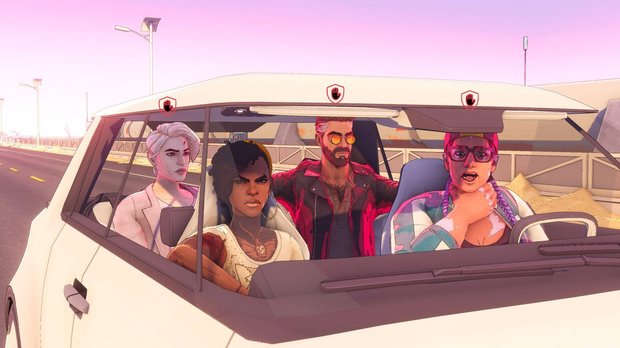
Pax, Sai, and Noam are three of these anomals, while Theo is a tech wiz and a Pacifica government agent gone rogue. Noam is able to use language to force others to calm down. Sai is able to turn their body into essentially a tank to break stuff. And Pax uses angry or bitter rhetoric to scare others into flight or submission. You play as Pax, the de facto leader of the group whom everyone turns to for the big decisions. As far as the cop that pulls you over, you can choose to use your vox, ask Noam to use hers, or try good ol’ fashioned smooth talking to get yourselves out of the situation.
Decisions sort of matter in Dustborn. Using or not using your vox can alter how you navigate certain obstacles and impact how other people in your group perceive you. And during conversations, you are often given choices of how to respond, with options ranging from harsh and impatient to empathetic, or simply listening while not saying anything. Every time you make one of these decisions, your relationship with others either improves or falters, as indicated by an icon with a plus or minus sign, and sometimes a banner describing how the other person is perceiving their role in the group or in the world. At the end of each chapter, the recent series of events are drawn out in comic book style, including panels that include your choices, along with a percentage of how other players in the world decided as well. Ultimately, though, the major plot points don’t change regardless of what you do.
To get to Nova Scotia, the group must travel through the United States and cross into Canada on the east coast, so to enter the U.S. Theo procures fake papers to pass them off as a touring rock band, despite the fact they’ve never played together and only have one song. The trip is planned out with pit stops to play gigs that keep up the facade while also connecting with allies in the underground for supplies. Each time your band has to play, you need to tackle a rhythm mini-game akin to Guitar Hero, timing your notes with the correct buttons. While playing poorly doesn’t change the plot, it can affect the mood of your mates. In between gigs there are opportunities to write new songs (playing a similar mini-game) and just straight up practice with the band. While you can use the keyboard in these sections (along with everything else the game requires), the designers heavily recommend you use a gamepad, which I wholeheartedly endorse.
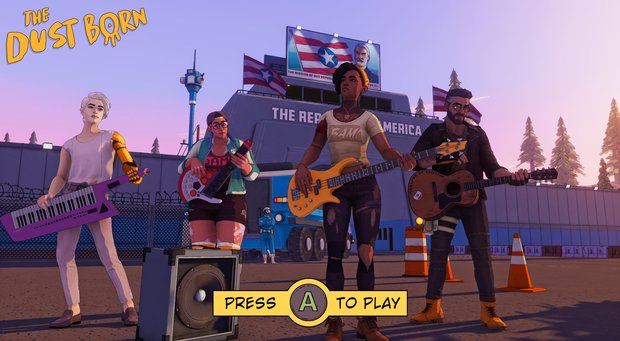
While I somewhat enjoyed these diversions, the songs themselves leave a lot to be desired. The lyrics are mostly anti-establishment punk rock – a genre I enjoy – but the rhyming is overly simplistic and the societal jabs too basic and obvious to be moving. The title track is somewhat catchy, but I have no desire to ever hear these songs again. Background music and ambient sounds fare better but are generally unmemorable.
One of the group’s first stops is at a compound for Pax to say goodbye to her mothers and her sister, as she’s planning to never come back after her mission. There she picks up her MeMe, a Game Boy-like device that has been jury-rigged to capture “echoes,” leftover sonic waste from the Broadcast. These echoes have been drifting around for decades, and if they get stuck inside another human it makes them severely paranoid. Some echoes are trapped in walls or other objects. Pax can capture these echoes to not only save other people, but to turn them into new vox by collecting enough of them. She will eventually wind up with eight, including BLOCK, DISCORD, and CANCEL. While they can occasionally be used in conversations to manipulate others, their primary use is for fighting.
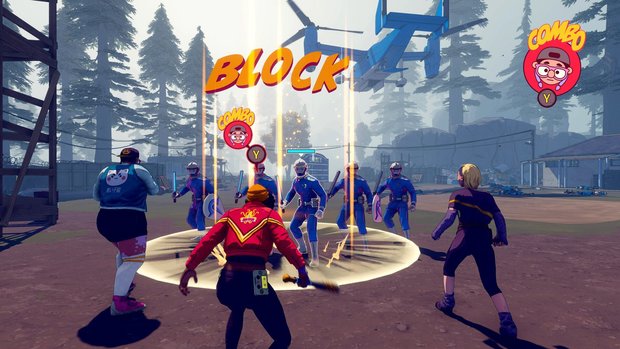
During pre-scripted sequences, the group will face off against any number of combatants. Moving around at will, you can choose to attack anyone you wish using any of several different tactics, including shouting (which brings up a simple quick time event sequence), throwing your bat, using your vox, or performing melee attacks with a simple button tap. Using vox is the most interesting, including ones that make the opponents paranoid of each other or think they’re on fire. Some vox can be used to make combos with your mates for extra damage. You can also block or dive to defend yourself. For those averse to fighting, there are three difficulty levels you can adjust, and if you fail enough in battle you can choose to skip the sequence. I played on normal difficulty and only failed a handful of times while rarely playing defense. And even if you do fall in battle, you simply revive at the exact same moment in the fight, making you essentially invincible. The game’s final battle, which is quite cinematic and appropriately difficult, is therefore rendered moot.
Sometimes I do enjoy me some basic combat, as destroying enemies can be cathartic regardless of the challenge. However, it’s difficult to enjoy even that in Dustborn as the dialogue is pure cringe. Pax will banter with everyone during combat, but not in a witty or sardonic way you will often find in action movies, but rather with banal remarks that are constantly interrupted by the noises of the battle. This feature can be turned off, though I didn’t even realize this was an option until I finished the game. Even more embarrassing is Pax’s pithy catch phrases when she executes her “Shout” tactic. Every time she yelled “Eyes on me!”, “Girl power!” or “Bitch attack!” I questioned my will to keep going.
The 3D graphic novel-style visuals are a mixed bag. There is definitely an appropriate level of cinematic scope, with some scenes that would translate well if Dustborn was turned into a movie. Many backgrounds offer a majestic view of this grisly new America, including panoramic shots of oceanic town remnants now mostly under water, and the wind-swept dust bowl that is the middle of the country. The pastel-like palette with heavy emphasis on yellow stands in contrast to the utter bleakness of the apocalyptic setting. While it’s visually attractive, the contrast felt off to me, as if the game didn’t want me to really feel how desolate and gloomy this world is. The animation is very smooth (while maintaining the comic book aesthetic), especially in the fight scenes where bats and bodies are flying everywhere. There is no blood or gore, as befits the art style used here. Unfortunately, close-up shots are often ruined by overlapping. For example, hair will poke through shirts, or legs will extend slightly below ground level. When two characters hug, their hair might go right through another’s face. And for a game that relies heavily on sentiment, these issues can take you out of the moment.
Sadly, puzzles are virtually non-existent. The only purpose of your inventory is to collect random items you find to give them as gifts, such as comic books, collectable President trading cards, or a harmonica. During downtime for the group (such as at campsites or hanging out on the bus), you are sometimes given the option to offer one of your gifts. On rare occasions, offering a gift to the wrong person (or to the right person if they’re in the wrong mood) will negatively affect your relationship, but most of the time it’ll be well received. Either way, the exercise feels trite and a reductive measure of interpersonal connection. There’s also the occasional basic task where another character tells you find something, but they’re all straightforward one-step solutions, and many of them will have big bold lettering in the air directing you where to go. The one puzzle I did enjoy was the game’s lone stealth sequence (or at least the only one I found), which is optional as an alternative to fighting.
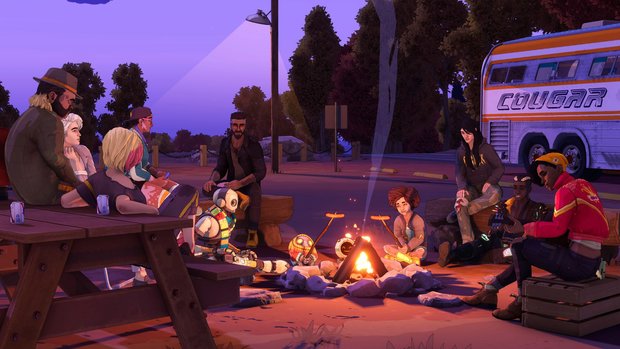
The only other optional activity is using your MeMe to capture echoes, behind which will often be said gifts or upgrades for your bat. Yet even this very simple undertaking is dumbed down as your MeMe will beep loudly at you if you’re in the vicinity of an echo, essentially eliminating the illusion of investigating.
I will give props to one section of the game, where your team reminisces the details of their pre-game heist to the rest of the group, which you must carry out by engaging in a simple turn-based RPG combat simulator. It’s by no means even remotely challenging, but it’s a welcome change of pace from all the times characters talk at length while you freely but aimlessly pan the camera around them just to give yourself something to do.
Despite the middling-at-best gameplay features and mechanics, Dustborn is really about the narrative, as a good 80 percent of the game is walking and talking (or sitting and talking). The scope of the adventure is enormous as we see our rock band friends traverse the continent, pick up several new anomal friends (and robots!) along the way, and touch on many heavy but important topics such as government oppression, gender identity, nontraditional families, and the power of empathy. Frustratingly, the story crashes and burns due to contrived plot turns, banal dialogue, and bloated length.
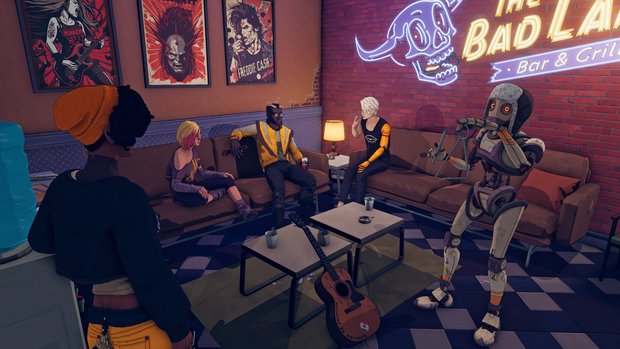
In one situation you’re supposed to meet up with one of Theo’s contacts in the underground. But when you get there, you get sent on the fetch quest to locate this person while Theo is unnecessarily preoccupied for no apparent reason. This nearly leads to a character’s death as the contact, quite understandably, freaks out that it’s not Theo banging down his door. More broadly, on every adventure Pax undergoes, usually only a couple friends from the crew join her, and of course there’s an obstacle that can only be surpassed using one of their vox. While perhaps necessary to manage the number of people on-screen at any given time, these situations would have been much more fun if they were puzzles where you had to figure out what vox may be useful and pick the right crew members to tag along. As it stands you don’t have any choice at all, so it just feels like a lot of dumb luck with no optional gameplay like in a party-based RPG.
Despite some pretty decent voice work by all involved, I was never moved even slightly by the story or any of the character development. Pax is narrating her inner thoughts constantly, which, like most people’s inner thoughts, are rarely interesting. Conversations in general rarely feel organic, as evidenced by characters often saying things akin to, “Go ahead and talk to everyone and see how they’re doing,” as if you’re the group’s grief counselor. Your friends end up feeling like directors telling you how to advance the plot. Finally, most everyone describes their feelings during every conversation; the intention appears to be to highlight friends being transparent and thoughtful, but it often feels like group therapy.
Beyond the dialogue, the story is hampered by the sheer number of people you collect throughout the game, leading to less and less screen time for all involved, sacrificing quality for quantity as it pertains to character arcs. You would think over the course of 20 hours there would be plenty of time to get to know people, but ultimately I felt like I barely understood anyone’s personality or motivations. And despite the lengthy storyline, the ending requires no input from Pax and very much feels like a deus ex machina.
I mentioned at the outset that decisions only sort of matter, which is never made clearer than during the game’s denouement. There are three characters (or sets of characters) that have different endings based on the selections you made throughout the story. In each of these instances, my choices were all made by 95% or more of the gaming community. It appears that, in general, what leads to these three endings are making empathetic choices and working hard for your friendships. I don’t have any desire to replay Dustborn anyhow, but I can’t imagine how painful it would be to play for another twenty hours while forcing Pax to be an indifferent jerk to everyone. And, frankly, if 95% of players all get the same ending, the designers failed to present thought-provoking or difficult choices along the way.
Final Verdict
Dustborn could have been something special. Its cool backstory, unique gameplay and diverse cast combined with an allegorical exploration of an array of fundamental social issues had the recipe to be epic and heart-rending. Yet quite the opposite happens as the paint-by-numbers plot, often silly dialogue, and underdeveloped characters frequently take the wind out of the sails of this overlong journey. This is especially disappointing given the developer’s impressive pedigree, but with no puzzles and only some effortless fighting and mini-game sequences to surround the story, there just isn’t enough reason to take the time needed to see this adventure to the end.
Hot take
While sporting an intriguing alternate timeline, a decent cast, and a variety of gameplay features, most players will find something to dislike in Dustborn, an epic action-adventure that fails to evoke excitement and sentiment over an excessively long playtime.
Pros
- Compelling look into the future based on an alternate history
- Using language is a unique take on the superhero genre
- Diverse cast with competent voice acting
Cons
- Characters are never fully developed
- Dialogue can be alternately cringe-worthy and dull
- Player agency is wrapped up in choices that barely matter
- Almost no puzzles and even the action lacks challenge
- Lasts about ten hours longer than its limited gameplay justifies
Beau played Dustborn on PC using a review code provided by the game's publisher.


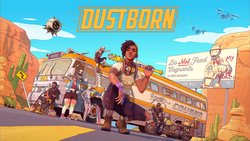





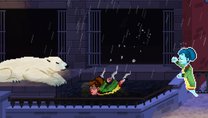


2 Comments
Want to join the discussion? Leave a comment as guest, sign in or register in our forums.
Developers and producers should realize that wokeness alone don't make decent games or movies
Reply
The people at Red Thread know how to (and have) made good characters and stories. They just bit off way more than they could chew here.
Reply
Leave a comment